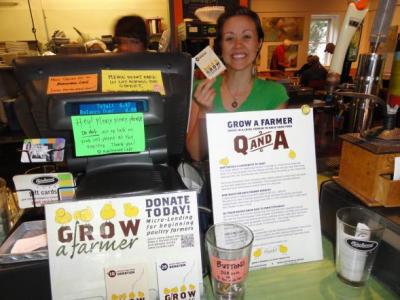It’s clear that we Americans need to select more healthy, natural and whole foods from the grocery shelves. What’s not always so clear are the ways in which we “vote with our dollars” in order to positively influence food policy and invest in the farmers who provide the good food. The farmers of the past, who have traditionally been older men from rural America, are now retiring and making room for two types of modern day farmers: big agriculture giants or young farmers. Many of our young farmers are turning out to be women and/or minorities. My question is: How do we support our small farmers, thereby, voting with our dollars.
According to the United States Census Bureau, Hispanics or Latinos constitute 16.3% of the total United States population and represent the largest ethnic minority group of the US. The Census for Agriculture has promising news as it highlights increasing diversity amongst US farmers and ranchers.
In 2007, there were more than 82,000 Hispanic farmers in the United States, a 14 percent increase from 2002. The census data also shows that Hispanic farm operators make up 2.5 percent of all farmers and ranchers in the U.S. The number of Hispanic female farm operators also increased 20 percent between 2002 and 2007. Data from the Center for Agriculture
Despite the positive growth in the growth of the number of Hispanic farmers, there is still a very long way to go in terms of increasing the total population of minority farmers. Perhap more important, is the need to increase minority and female farm ownership rates. A recent Minnesota Public Radio (MPR) broadcast featuring ground-level entrepreneurship noted that Latinos represented just under a quarter of all new entrepreneurs.
The Main Street Project’s sustainable food and agriculture program is one noteworthy organization working to invest both education and financial resources into individuals who are interested in running their own farm-based business--otherwise known as “agripreneurs.” “Latinos historically have a very strong entrepreneurial spirit, but they lack the financial capacity to start their own businesses as they make too little money to be considered for conventional loans,” remarked Main Street Project program director, Reginaldo Haslett-Marroquin.
"Once I start my own [poultry] business, I would like to reach the point where it would be sustainable -- and to sustain me and my family," said current agripreneur trainee, Ivan. The Main Street Project's "Grow a Farmer" and incubator projects train entrepreneurs (21 in 2011), provides them access to land and facilities such as feed and grow houses, and provides small loans in order for trainees to purchase materials, equipment and chickens. The small loans give minority and disenfranchised farmers who are normally redlined out of the conventional banking system a fair chance to try to lift off the ground and become part of the foundation of our local food systems.
Through the Grow a Farmer project, farmers are given contracts outlining loan terms and are expected to repay loans which are placed into a revolving fund intended to help the next person in need. Main Street Project works with local co-ops, farmers markets, and restaurants to help connect the new farmers with venues in which to sell their free-range chickens.
Grow a Farmer was initially seeded with generous support funds from the Southern Minnesota Initiative Foundation (SMIF) and the Just Food Co-op. Individuals can support Grow a Farmer by purchasing seed packets, containing organic seeds, which are available at Mississippi Market, Seward Co-Op, Eggplant Urban Farm Supply and the Birchwood Cafe. Donations may also be made directly at giveMN.org.
 You can support the Grow a Farmer program by purchasing packets at places like the Birchwood Cafe
You can support the Grow a Farmer program by purchasing packets at places like the Birchwood Cafe
Clearly demographics indicate that our country is growing and changing into a much more diverse melting pot. Let’s do our best to ensure that future generations reap the benefits of healthy communities and sustainable food systems. Please support and promote your local farmers and farm initiatives.

Leigh Ann Ahmad was dragged kicking and screaming to the Cities by her husband; having been born and bred in Cleveland, Ohio, she just could not fathom how colder could be better. Now, five years and two kids later, she cannot imagine a better place to play and thrive. She’s a reformed carb-aholic, wannabe writer, social justice advocate, book-club geek, veggie grower and local foods connoisseur. Her last article about local folks working to improve our food system was: Together we can create a healthier future for our children.




